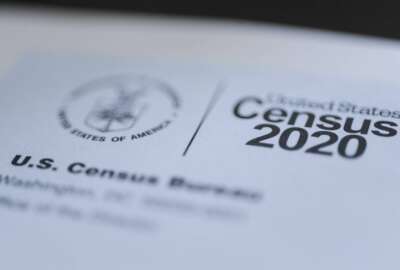Hubbard Radio Washington DC, LLC. All rights reserved. This website is not intended for users located within the European Economic Area.
On Air: Federal News Network
Trending:
Exclusive: Gordon stresses future continuity as he prepares to leave
OFPP Administrator Dan Gordon looks back on his tenure highlighting the successes of his office. Gordon will become the associate dean of contracts law at The G...
wfedstaff | June 4, 2015 2:25 pm
As Dan Gordon prepares to leave after two years as the administrator of the Office of Federal Procurement Policy, his message to the acquisition community is simple and clear: continuity.
Gordon, who announced Nov. 2 he is leaving to become the associate dean for government contracts law at the George Washington University Law School, said the ongoing initiatives under the three-pronged approach started by the administration to improve the acquisition process will stay on course toward their goals.
“You are going to see my successors and the wonderful staff at OFPP continuing our efforts,” Gordon said from his office in Washington during an exclusive interview with Federal News Radio. “We’ve been working with the Hill, with the appropriators and others, to ensure there is adequate funding for the acquisition workforce at the agencies. We will continue to do that. We are going into challenging times, but we will be focused on strengthening and protecting the acquisition workforce.” 
Gordon said he will be working on these areas up until Dec. 31 when he walks out of the Old Executive Office Building for the last time.
“I am at this point almost entirely focused on OFPP and our work here at OMB,” he said. “I will work here full steam ahead until I move on at the end of December.”
Not done yet
And he still has a lot to do. Just this summer, OFPP began pressing agencies to use suspension and debarment tools more often. Then OMB Director Jack Lew issued a memo requiring their use.
Gordon also will play a big role in finalizing the fiscal 2013 budget request and the remaining 2012 spending bill Congress still must pass. All of this comes in the light of expected budget cuts and the failure of the super committee to reach a deal.
“One of the hallmarks of my work has been listening to the various communities, that’s both within the agencies, and in the vendor communities as well as on the Hill,” he said. “I know there is nervousness in industry as well as at the agencies and disappointment at the failure of the Congressional super committee to reach an agreement. That said, the fact is under the law, Congress has until January 2013 to deal with the problems and as a result in the near term I would not expect any impact.”
Gordon added more broadly, the acquisition community understands the pressure to reduce spending and take advantage of the government’s buying power.
That is why Gordon pointed to the strategic sourcing initiative as one of the highlights of his tenure.
He said the focus by agencies already is paying off in terms of millions in savings from changing the way agencies pay for package delivery.
“The contract is set up so that when you order delivery you can decide whether you want to pay extra to get whatever you are sending delivered the next day or whether you want to save money and have it delivered by ground delivery,” Gordon said. “It’s the same thing that we face when we are ordering from private companies on the Web where most of us when we are on the screen asking if we want to pay extra for delivery tomorrow morning. Most of us say ‘It’s not worth that extra money.’ In the olden days, way too often we were automatically paying that high extra fee to get delivery the next morning. Now, the latest data I see, and I get very frequent reports on this, most of the time we are satisfied with ground delivery, which is an enormous savings to our taxpayers. We were spending money for no purpose. We now are savings those dollars.”
Gordon said the next areas for strategic sourcing are in the technology area and are led by the General Services Administration. He said GSA issued two blanket purchase agreements in the recent months, one for print management services and one for wireless devices and plans.
“These are areas we are working very closely with the E-Gov office,” he said. “Agencies spent an enormous amount of money and there is a lot of low-hanging fruit. There are way too many situations where agencies — and that means taxpayers — are paying monthly fees for wireless plans, for cell phones or BlackBerrys or other devices that aren’t used. There is no one using them, and yet we are paying a monthly fee. We can save an enormous amount by doing a good inventory and getting on top of what we are buying.”
Workforce improvements
Gordon said all the strategic sourcing and better buying activities can only be so effective if the acquisition workforce isn’t well equipped to use the contracts.
This is one of several reasons why he spent so much of his tenure trying to grow the number of contracting officers, contracting officer representatives and others in the acquisition workforce.
Gordon said agencies have reversed the downward trend of the acquisition workforce with modest increases. And just as important, Gordon said agency-wide and government-wide training has been improved.
“We are focused on making our training better, more useful, more timely and more current for our employees,” he said.
For instance, when OFPP and the Federal Acquisition Regulations Council issue a new rule there is training ready to go at the Federal Acquisition Institute and the Defense Acquisition University.
“A good example is the new rule for women-owned small businesses,” Gordon said. “We got the training ready so when the rule came out. The training was available — a very important thing. We don’t want our people to be faced with a new rule without the tools to use it.”
He said another example of strengthening the acquisition workforce is the new contracting officer’s representative’s standards and certification requirements. OFPP issued a policy in September.
“That is really correcting a weakness that has been out there for a couple of decades,” he said. “That is a particularly important where we have made real progress.”
Gordon said through the AcqStat sessions OFPP is keeping tabs on how agencies are increasing the number of and training of contracting officers and the CORs.
“What we are hearing is, they are really paying attention for the first time, in terms of getting their people certified, and being sure they have qualified people managing those contracts,” Gordon said. “It is a bright light of progress in what has been prior to this administration a pretty bleak picture.”
During the review sessions, OFPP asks agencies how many contracting officers and CORs they have and how many are certified to ensure agencies are making progress.
Insourcing met its goals
Gordon received a lot of praise for his work to strengthen the acquisition workforce.
Another initiative to rebalance the federal workforce was the insourcing initiative. Many thought it was a reaction to the Bush administration’s outsourcing initiative. But Gordon said it not only wasn’t a reaction to outsourcing, but the goal was never to bring back large numbers of employees.
Gordon said he didn’t agree with the perception that insourcing didn’t work.
“What we said was we will be sure inherently governmental functions are done by government employees,” he said. “But closely associated functions and critical functions can be done by contractors as long as the government does its job in terms of contract management, checking to be sure, in terms of management controls, that federal employees are in charge and that federal employees are ensuring that contractors stay in their appropriate roles. Insourcing has been limited, targeted and focused and in my opinion has been successful in doing exactly what we promised it would do.”
Gordon said insourcing was never designed to be used to save money, but rather rebalancing the federal employee and contractor relationship or to better manage contracts.
As for the future, Gordon will teach and help improve the curriculum of the procurement lessons for the law school.
“It’s always a challenge to decide when to move,” he said. “The position at George Washington was a very tempting one. It is a terrific position as associate dean for government contracts law. With very mixed emotions, I accepted their offer of the position.”
Gordon said the associate dean position is a new one and a huge honor to be named the first one.
Gordon said his current staff Lesley Field, Matthew Blum and others will continue down the same path the administration has been pursing across the three focus areas.
Gordon said the success of his office came because of his approach that focused on his knowledge of acquisition, his ability to listen, two-way communication with agencies, industry and the Hill and ideas not driven by ideology, but making real change.
“We let people know what we are doing, we don’t surprise people and we don’t ambush people,” he said. “That has been very much appreciated by all these communities. We are very reality focused. We want to improve the reality on the ground. We don’t propose things that are unrealistic and we don’t push things that are unrealistic. We are worried about what will really help our acquisitions and protect the taxpayer’s interest as we go forward.”
RELATED STORIES:
OFPP Administrator Daniel Gordon leaving
Push for more suspension, debarments receives mixed reactions
OFPP sees millions in taming cell phone contracts
GSA: Changing printing habits could save government millions
OFPP boosts requirements for contracting reps
Search is on for Gordon’s OFPP successor
Copyright © 2024 Federal News Network. All rights reserved. This website is not intended for users located within the European Economic Area.
Jason Miller
Jason Miller is executive editor of Federal News Network and directs news coverage on the people, policy and programs of the federal government.
Follow @jmillerWFED





